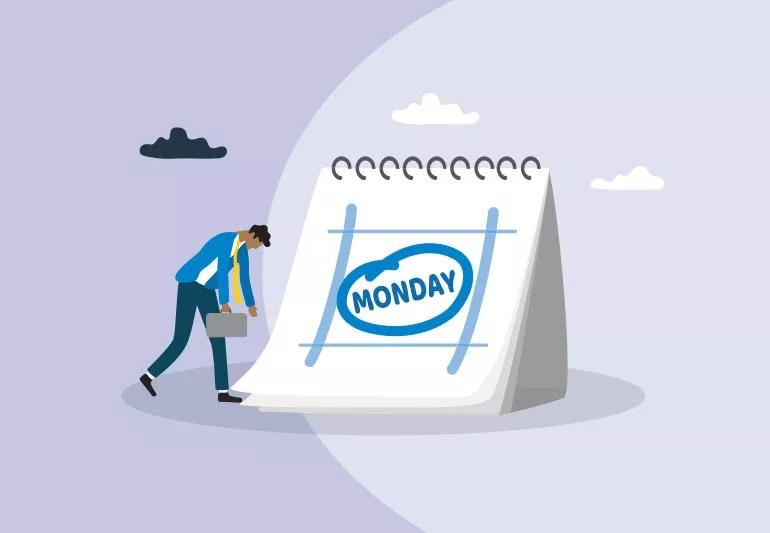From ‘Sunday scaries’ to passive-aggressive coworkers, you can learn to navigate your workplace woes

Even if you love your job (lucky you!), stress and burnout can creep up unannounced, building slowly until you suddenly realize that you’re overwhelmed and underwater. And if you hate your job? Well, in that case, stress and burnout can be ever-present, following you not just throughout the workday, but also into your personal time, impacting your mental health and your very well-being.
Advertisement
Cleveland Clinic is a non-profit academic medical center. Advertising on our site helps support our mission. We do not endorse non-Cleveland Clinic products or services. Policy
Wherever you fall on the spectrum, there are ways to cope. From better understanding how job stress impacts you to dealing with toxic coworkers to knowing when it’s time to walk away, here are a variety of ways to approach work-related stress and burnout and find the peace of mind you crave.

Image content: This image is available to view online.
View image online (https://assets.clevelandclinic.org/transform/012182f0-3a89-4925-9bd1-e578c845e1fa/sundayScaries-1351823126-770x533-1_jpg)
If your stomach is tied in knots every Sunday evening as you anticipate Monday’s arrival, you’ve got the Sunday scaries — feelings of intense anxiety and dread that occur at the start of the work week. Psychologist Susan Albers, PsyD, says they can even lead to headaches, depression and trouble sleeping. With these 10 ways to combat the Sunday scaries, you can get back to enjoying your weekend to the fullest and stop dreading the week to come.

Image content: This image is available to view online.
View image online (https://assets.clevelandclinic.org/transform/ec041509-ca1b-4f9b-8a01-3b0722491645/workFocusWindow-642394299-770x533-1_jpg)
Never-ending to-do list? Sometimes, work stress comes from feeling like you can’t get a handle on all of the things on your proverbial professional plate. These tips can help:
Advertisement
If you just can’t seem to shake your forgetfulness, procrastination, chronic restlessness and lack of follow-through, you may have undiagnosed adult ADHD. If these issues are impacting your work, talk to a healthcare provider about treatment options.

Image content: This image is available to view online.
View image online (https://assets.clevelandclinic.org/transform/f2c30bfd-0196-4f67-9d5e-2c36bd3f9b21/ImposterSyndrome-1369957754-770x533-1-1024x709_jpg)
At some point or another, we’ve all felt like we’re not good enough. A whopping 70% of people have experienced it! If you’re feeling this way about your work, you may be dealing with impostor syndrome, the false belief that you aren’t actually as capable or smart as others think you are. The good news, says psychologist Susan Albers, PsyD, is that you can learn to overcome impostor syndrome and start believing in your own capacity and ability.

Image content: This image is available to view online.
View image online (https://assets.clevelandclinic.org/transform/d9c8a751-b57b-4021-8a6a-228942064b6f/DifficultCoWorkers-1213400090-770x533-1-1024x709_jpg)
Nothing sets the tone at work quite like coworkers do. Good ones can make all the difference and, well … so can bad ones, but in all the wrong ways. You can’t necessarily change the way other people act, but you can take steps to deal with troublesome colleagues and toxic workplaces.

Image content: This image is available to view online.
View image online (https://assets.clevelandclinic.org/transform/c9a6c187-b46f-4001-bd9c-753d2ff06761/workaholic-1149282247-770x533-1_jpg)
Can’t seem to stop working? If you’re a self-proclaimed workaholic, you might think it’s just a fact of your life. But it doesn’t have to be—and for the sake of your health, it really shouldn’t be. Working too much can impact your health, making you more likely to skip meals, postpone sleep, abandon exercise and neglect relationships — so it really is vital that you insist on a work-life balance, says psychologist Amy Sullivan, PsyD, and learn how to relieve stress.

Image content: This image is available to view online.
View image online (https://assets.clevelandclinic.org/transform/9c247228-858c-4850-9fc9-6b7ef382cbd7/Burnout-1310105038-770x533-1_jpg)
This one’s tough because, honestly, you may not realize you’re burned out until it’s too late, and you’ve already crossed from “really tired” into “too exhausted to function” territory. Prevention is key: First, study up on the signs of job burnout so you’re more likely to see it coming if it happens to you. But if you’re already in the throes of it, psychologist Adam Borland, PsyD, says you can make a plan for recovery from burnout and learn how to prevent it going forward.

Image content: This image is available to view online.
View image online (https://assets.clevelandclinic.org/transform/fdac37d9-22e3-4323-b54d-2626436de220/yogaStretchWork-511744942-770x533-1_jpg)
Whether you’re sitting in front of a screen all day or are constantly on the go at a fast-paced, all-over-the-place job, your body is likely to feel the effects of work-related stress. Arm yourself with tools that can help you stay well, like:
Advertisement

Image content: This image is available to view online.
View image online (https://assets.clevelandclinic.org/transform/4757d62b-0ea3-4f53-817f-2d80b5cd61ea/BigNoticeQuittingJob-1251608533-770x533-1-1024x709_jpg)
As Kenny Rogers once sang, “You gotta know when to hold ’em, know when to fold ’em…” If you’ve tried establishing boundaries, dealing with toxicity and implementing a work-life balance but still feel overwhelmed by and unhappy with your job… Well, it might be time to turn in your two weeks’ notice, if you can swing it, says clinical psychologist Becky Tilahun, PhD.
Remember: You deserve to be well — in your workplace and beyond. Learning to embrace healthy coping mechanisms can help you preserve your mental health at your job and throughout the rest of your life.
Advertisement

Sign up for our Health Essentials emails for expert guidance on nutrition, fitness, sleep, skin care and more.
Learn more about our editorial process.
Advertisement

Try breaking down tasks into manageable to-do lists and relying on time management techniques

Working beyond your limits can increase illnesses and accidents related to your physical and mental well-being

Help calm the angst that can come with the start of a new work week by adopting a positive mindset, planning an activity and getting some exercise

Taking a stand throughout the day can lower your risk of disease while improving your energy, focus and productivity

A hostile work environment can foster a culture of aggression, doubt and negativity that’s harmful to your health and success

Not having paid sick leave, working night shifts and lacking consistency in schedule or pay can cause serious psychological distress

Schedule breaks, stand and stretch, and rely on alarms, to-do lists and other tools to help keep you focused

Work burnout can leave you exhausted and frustrated at work and beyond, but you can beat it by setting boundaries and surrounding yourself with positivity

Even small moments of time outdoors can help reduce stress, boost mood and restore a sense of calm

A correct prescription helps your eyes see clearly — but as natural changes occur, you may need stronger or different eyeglasses

Both are medical emergencies, but they are very distinct events with different causes